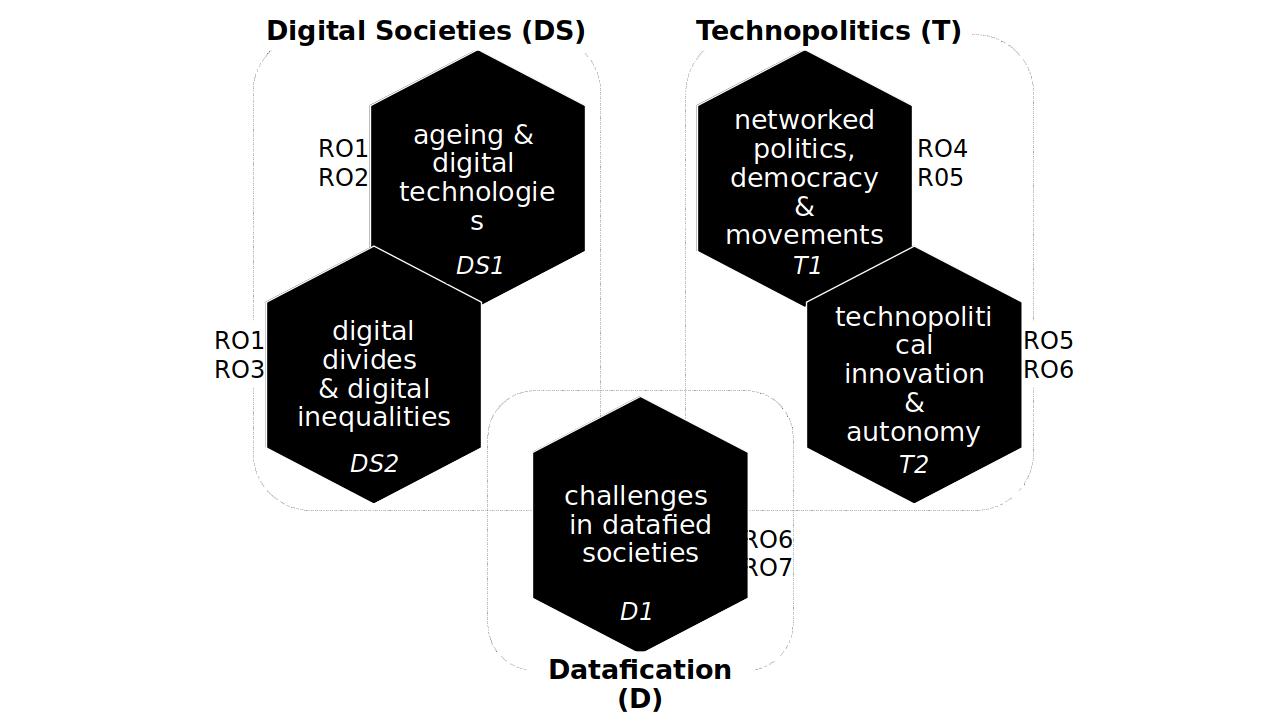Digital communication networks constitute a structural dimension of contemporary societies, playing a key role in the sociotechnical architecture that establishes new typologies of center-periphery and access-exclusion as well as new forms of governance and modes of political action and participation.
Within this context, CNSC’s main goal is to analyze selected relevant social challenges of the network society -such as increasing social inequalities, the crisis of democracy and the ageing demographic shift- and their interplay with digital communication.
We approach these issues from a critical, interdisciplinary and applied perspective. We seek, on the one hand, to produce useful insights that build theory from empirical analysis. On the other hand, we try to reinforce our role as an agent of social transformation. In this sense, the aim is to increase awareness in key social aspects, and build collaborative ties with a diversity of social actors in alignment with an ethical and responsible research agenda.
Research areas
We organize our research in three timely areas of interest that split into five research lines (Figure 1).

Figure 1. CNSC Research Areas, Research Lines and Research Objectives (RO)
(DS) Digital Societies
It studies digital (mobile) communication practices in non-central societal groups, mainly older people and low-income populations. Current social trends, within a context of accelerated digitization, justify the relevance of this research area. On the one hand, ageing is a defining demographic shift of contemporary societies but precisely older individuals often lack behind in the adoption of (new) digital technologies. On the other hand, inequalities do not disappear but might be exacerbated due to the current health crisis.
(T) Technopolitics
It seeks to analyze new forms of politics in networked social movements, parties and public institutions, based on emerging digital practices and technologies, as well as the reverse, the political shaping of such technologies. Our work also aims to intervene into these processes from a situated, experimental and interdisciplinary perspective, opening new narrative, analytical and practical territories.
(D) Datafication
It crosses the other two areas. It analyzes the social implications of the combination of hyper digitization and hyper datafication, with particular interest on the methodologies that emerge in such a context. The interest lies, on the one hand, in analyzing how these methodologies reinforce and create new strands of discrimination and, on the other hand, on developing alternative analytical tools to rethink and remake digitized sociallity.
Research lines
Three research areas (DS, T & D) split into five research lines (DS1, DS2, T1, T2 & D1).
(DS1) Ageing and digital technologies
It examines the processes of ageing in contemporary digital societies, to assess the ways in which older people are part of the (mobile) digital revolution, and contribute to the design of inclusive public policies and technologies. The increase of aged and ageing populations justifies the need of putting the older people at the center of the research on everyday life technologies from a non-caring perspective that avoids deficit-based approaches. Therefore, we combine sociological, ethnographic, and human-computer interaction perspectives.
(DS2) Digital divides and digital inequalities
It analyses how pervasive digital technologies create and reinforces digital divides. We thus focus on populations with limited or no access to digital communication technologies, with the older ones among them. We take into account not only the access digital divide but also the inequalities caused by lack of skills and limited uses. Approaches in this area combine cultural and socioeconomic perspectives.
(T1) Networked politics, democracy and movements
It studies the conditions (specially, the digital infrastructures), structures, and broader impacts of political processes today, from a descriptive as well as from a normative perspective. The analyzed cases range from digital democracy and social movements up to emerging forms of data-based politics (datapolitik).
(T2) Technopolitical innovation and autonomy
It critically studies and promotes technologies and social processes that nurture collective and personal autonomy and flourishing, through various forms of theoretically and practically oriented research.
(D1) Challenges in datafied societies
It critically analyzes the various ways in which datafication and society shape each other today. It moves from foundational problems in Social Theory and Science, Technology and Society Studies to cases such as the conditions, forms and impacts of digitalization, and its relations with everyday life.
Research objectives
We define seven research objectives (RO) that contribute to one or more research lines.
RO1. Strengthen available empirical evidence on older individuals’ digital practices in both developed and developing contexts for a better theorization of the intersection of ageing and digitization. [Contributes to DS1, DS2]
RO2. Help breaking ageist stereotypes about older individuals regarding (a) digital technologies (non-)adoption and (dis-)appropriation, and (b) their role as digital makers with transformative capacities in their local contexts. [Contributes to DS1]
RO3. Analyze the dimensions of digital divides and their consequences for the development of individuals’ potentialities to inform policymakers. [Contributes to DS2]
RO4. Contribute to research in social theory, especially on the emergence and configurations of social identity, social autonomy, and social movements today. [Contributes to T1]
RO5. Develop basic and applied research, as well as innovation, on emerging forms of digital politics and infrastructures. [Contributes to T1 and T2]
RO6. Define key theoretical concepts and discourses around technology and society. [Contributes to T2, D1]
RO7. Assess the constraints and opportunities that hyper-datafied environments and digital methodologies bring to our research interests from a critical point of view to create awareness of the matter and contribute to counterbalance power relationships of digital societies. [Contributes to D1]
